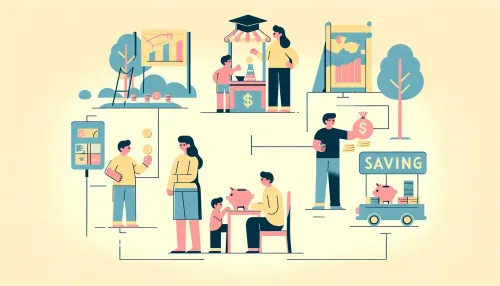Understanding the Basics of Budgeting: A Practical Guide for Beginners

Understanding Financial Goals and Expense Tracking
Are you ready to take control of your finances and pave the way for a secure financial future? Understanding the basics of budgeting is the key to achieving your financial goals, whether it's building an emergency fund, paying off debt, or saving for a major purchase. In this comprehensive guide, we will delve into the fundamental concepts of budgeting, offering practical advice and actionable tips for beginners in the realm of personal finance and investing.
Before diving into the nitty-gritty of budgeting, it's crucial to establish clear financial goals. Whether you aspire to save for retirement, purchase a home, or eliminate debt, defining your objectives will provide direction and motivation for your budgeting journey. Start by outlining your short-term and long-term financial goals, ensuring they are specific, measurable, achievable, relevant, and time-bound (SMART).
Setting SMART Financial Goals
Additionally, tracking your expenses is integral to gaining insights into your spending habits. Leverage digital tools such as expense tracking apps or spreadsheets to monitor where your money goes. This practice enables you to identify areas where you may be overspending and opportunities for potential savings.
Importance of Tracking Expenses
A realistic budget plan serves as a roadmap for managing your finances effectively. Begin by calculating your total monthly income, including wages, bonuses, and additional revenue streams. Next, list all your essential expenses such as housing, utilities, groceries, and transportation. Allocating a portion of your income towards non-essential expenses like dining out or entertainment is also vital for maintaining balance in your budget.
Creating an Effective Budget Plan
Remember to prioritize saving and debt repayments within your budget plan. Set aside a portion of your income for an emergency fund and contribute to retirement accounts or investment portfolios if feasible. As a rule of thumb, aim to allocate at least 20% of your income towards savings to build financial resilience.
Calculating Monthly Income and Essential Expenses
In the digital age, an array of budgeting tools and apps are readily available to streamline money management. Platforms like Mint, YNAB (You Need A Budget), and PocketGuard offer features that automate expense tracking, categorize spending, and provide insights into your financial habits.
These tools also facilitate goal setting and offer personalized recommendations to optimize your budget. With real-time updates on your financial standing, leveraging technology empowers you to make informed decisions while staying on top of your budgetary commitments.
Top Budgeting Apps to Consider
Crafting a budget is just the beginning; adhering to it is where the magic happens. Implement strategies such as the envelope system or utilizing prepaid debit cards to allocate specific funds towards different expense categories. These methods instill discipline and prevent overspending by enforcing limits within each category.
Moreover, adopt a proactive approach by revisiting your budget regularly—especially when encountering changes in income or ongoing expenses. Stay adaptable and pivot as necessary to ensure your budget remains reflective of your financial circumstances.
Related Article: The Financial Journey of Fortune Builders: Stories of Personal Finance and Investing Success
Strategies for Sticking to Your Budget
Despite best intentions, individuals often encounter roadblocks that derail their budgeting efforts. One common pitfall is underestimating variable expenses such as irregular bills or seasonal costs. Combat this challenge by anticipating these expenses and creating a separate category in your budget to account for fluctuations.
Effective Budgeting Techniques to Implement
Another challenge arises from impulsive spending habits that sabotage budget adherence. Combat this by introducing a "cooling-off" period before indulging in non-essential purchases. By delaying gratification and reassessing the necessity of the expense, you can avoid frivolous spending that deviates from your budget plan.
In conclusion, understanding the basics of budgeting is pivotal for personal finance management. By establishing clear financial goals, creating a realistic budget plan, leveraging technology for money management, implementing adherence strategies, and navigating common pitfalls effectively, you can wield mastery over your finances with confidence.
Related Article: The Art of Money Mastery: Lessons in Growing Wealth and Navigating Financial Waters
Avoiding Common Budgeting Mistakes
Seize this opportunity to embark on a transformative journey towards financial empowerment through prudent budgeting practices!
Frequently Asked Questions
To create a realistic budget plan, start by calculating your total monthly income, including all revenue sources. Next, list essential expenses like housing and groceries, and allocate funds for non-essential expenses such as entertainment. Prioritize savings and debt repayments, aiming to set aside at least 20% of your income for savings to ensure financial stability.
Budgeting tools and apps streamline money management by automating expense tracking and categorizing spending. They provide insights into financial habits, facilitate goal setting, and offer personalized recommendations. With real-time updates on your financial status, these tools empower users to make informed decisions while staying committed to their budgeting plans.
Common budgeting pitfalls include underestimating variable expenses and impulsive spending. To overcome these challenges, anticipate irregular bills by creating a separate budget category for them. Additionally, implement a "cooling-off" period before making non-essential purchases to reassess their necessity, helping you stay on track with your budget.
Check Out These Related Articles

The Art of Raising Financially Savvy Kids: Parenting Hacks for Teaching Money Skills

The Power of Fiscal Stability: Mastering Cash Flow Management for Long-Term Solvency

The Top 5 Rookie Mistakes in Personal Finance Every Beginner Should Avoid

